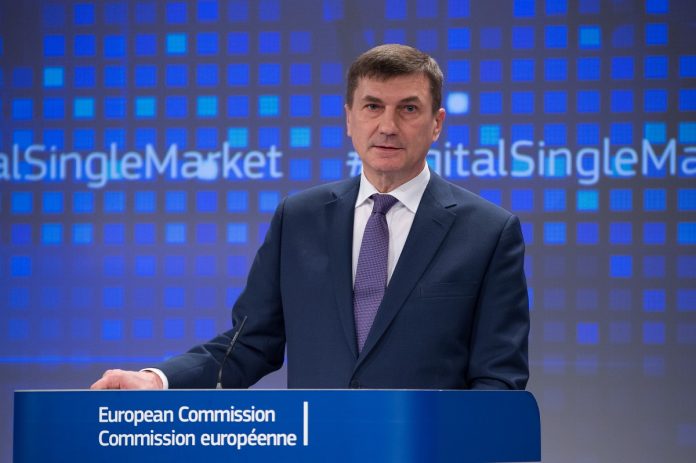Andrus Ansip, European Commission VP for the Digital Single Market outlines why science and research play an integral role in creating a digital Europe
Wherever we look, digital issues are firmly on the global political agenda: a clear sign of their socio-economic importance and political relevance.
We have entered a new era of digital globalisation, defined by data flows that transmit information, ideas and innovation. As data flows go global, Europe has to look beyond its borders, which means being linked to the global digital economy and accompanied by the right infrastructure.
This is true for any country. Connections are social and economic lifeline. Affordable and inclusive global connectivity is in everyone’s interests, wherever they are located.
It is why the EU is strongly committed, politically and financially, to science and research cooperation on a wide range of related issues. These include high-performance computing (HPC), cybersecurity, cloud computing, interoperability and the common technical standards needed to develop 5G and Internet of Things technologies.
In all these areas, open cooperation and innovation are vital, for the simple reason that they affect the entire global digital community. The increasing importance of data flows in every type of international exchange makes that all the more relevant.
Investing in computing power
A key part of the philosophy that underpins our plan to build a Digital Single Market (DSM) is to help Europe’s industry go digital as much as possible.
Companies across many industry sectors are coming to rely on supercomputer power to innovate, cut costs and the time to get their products and services to market. That is why HPC is a vital tool to increase competitiveness and should be seen as a strategic resource for the future of EU industry.
HPC has countless applications with a direct positive impact on people’s lives: designing and simulating new medical treatments; designing energy-efficient buildings; providing accurate weather forecasting. To get the full benefit from this sheer supercomputing power, the industry must be able to access adequate and available HPC infrastructure. Until very recently, the EU did not have any HPC machine in the world’s top 10 – we expect one, from Spain, to make it just now. What is clear is that not every EU country is in a position to build and maintain such infrastructure – and that it is more efficient to join forces to do so.
Other countries around the world are moving fast. Since we cannot afford to lag behind, the EU has to work together. In March, in a spirit of true European cooperation, seven EU countries pledged to work together to build the next generation of computing and data infrastructure: France, Germany, Italy, Luxembourg, Netherlands, Portugal and Spain. We want more countries to follow their lead and indeed Belgium and Slovenia have done so recently.
Our aim is for every research centre and project, every researcher, to have access to high-quality supercomputing, storage and data facilities across Europe. This infrastructure will be available for scientific communities, industry and the public sector – wherever the users are located.
We should also remember that it is not only industry, scientists and engineers that stand to gain from HPC availability: Europe’s researchers also depend on HPC and are among its major users.
Our future HPC infrastructure will support the European Open Science Cloud, allowing millions of researchers to share and analyse data in a trusted environment across technologies, disciplines and borders.
People power
We often talk about digital transformation in the context of technology and data. But above all, it is about people, about their being at ease in the cyberspace, and of course about jobs. Digitisation directly affects employment, it will, inevitably, change some jobs, replace some by machines and new processes. As this happens, however, digital progress will also create other new jobs and services. Europe’s app economy is a good example. Until quite recently, it did not even exist. But it is hard to think of another industry that has created so many jobs in so little time.
In today’s increasingly digital world, it is essential to have the right skills. Unfortunately, Europe is no stranger to the digital skills gap: nearly 40% of the workforce does not have basic digital skills.
Rectifying this situation is another major element of the Digital Single Market project. We know that in the near future, some 90% of jobs – in careers such as engineering, accountancy, nursing, medicine, art, architecture, and much more – will require some level of digital skills.
This is where the EU can help, and already does a lot of work – for example, with the Digital Skills and Jobs Coalition launched in December, which aims to develop and expand the pool of European digital talent. It will help to provide people – young and old, the employed as well as job seekers – with the skills they need to use digital technologies and then apply them in a working environment.
The Digital Single Market is about investing more in new technologies – whether HPC, cloud, quantum computing or microelectronics – but also as much in people.
Without a digitally skilled workforce, Europe’s peoples and businesses will not be able to make the most out of the data economy that the Digital Single Market promises to provide.
Andrus Ansip
Vice-President for the Digital Single Market
European Commission
https://ec.europa.eu/commission/commissioners/2014-2019/ansip_en











